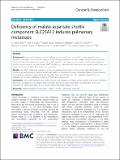Notice
This is not the latest version of this item. The latest version can be found at:https://dspace.mit.edu/handle/1721.1/131944.2
Deficiency of malate-aspartate shuttle component SLC25A12 induces pulmonary metastasis
| dc.contributor.author | Alkan, H. F | |
| dc.contributor.author | Vesely, Paul W | |
| dc.contributor.author | Hackl, Hubert | |
| dc.contributor.author | Foßelteder, Johannes | |
| dc.contributor.author | Schmidt, Daniel R | |
| dc.contributor.author | Vander Heiden, Matthew G | |
| dc.contributor.author | Pichler, Martin | |
| dc.contributor.author | Hoefler, Gerald | |
| dc.contributor.author | Bogner-Strauss, Juliane G | |
| dc.date.accessioned | 2021-09-20T17:31:04Z | |
| dc.date.available | 2021-09-20T17:31:04Z | |
| dc.date.issued | 2020-11-26 | |
| dc.identifier.uri | https://hdl.handle.net/1721.1/131944 | |
| dc.description.abstract | Abstract Background Aspartate biosynthesis and its delivery to the cytosol can be crucial for tumor growth in vivo. However, the impact of intracellular aspartate levels on metastasis has not been studied. We previously described that loss-of-aspartate glutamate carrier 1 (SLC25A12 or AGC1), an important component of the malate-aspartate shuttle, impairs cytosolic aspartate levels, NAD+/NADH ratio, mitochondrial respiration, and tumor growth. Here, we report the impact of AGC1-knockdown on metastasis. Results Low AGC1 expression correlates with worse patient prognosis in many cancers. AGC1-knockdown in mouse lung carcinoma and melanoma cell lines leads to increased pulmonary metastasis following subcutaneous or intravenous injections, respectively. On the other hand, conventional in vitro metastasis assays show no indication of increased metastasis capacity of AGC1-knockdown cells. Conclusion This study highlights that certain branches of metabolism impact tumor growth and tumor metastasis differently. In addition, it also argues that commonly known metastasis indicators, including EMT genes, cell migration, or colony formation, do not always reflect metastatic capacity in vivo. | en_US |
| dc.publisher | BioMed Central | en_US |
| dc.relation.isversionof | https://doi.org/10.1186/s40170-020-00232-7 | en_US |
| dc.rights | Creative Commons Attribution | en_US |
| dc.rights.uri | https://creativecommons.org/licenses/by/4.0/ | en_US |
| dc.source | BioMed Central | en_US |
| dc.title | Deficiency of malate-aspartate shuttle component SLC25A12 induces pulmonary metastasis | en_US |
| dc.type | Article | en_US |
| dc.identifier.citation | Cancer & Metabolism. 2020 Nov 26;8(1):26 | en_US |
| dc.identifier.mitlicense | PUBLISHER_CC | |
| dc.eprint.version | Final published version | en_US |
| dc.type.uri | http://purl.org/eprint/type/JournalArticle | en_US |
| eprint.status | http://purl.org/eprint/status/PeerReviewed | en_US |
| dc.date.updated | 2020-11-29T04:21:15Z | |
| dc.language.rfc3066 | en | |
| dc.rights.holder | The Author(s) | |
| dspace.date.submission | 2020-11-29T04:21:15Z | |
| mit.license | PUBLISHER_CC | |
| mit.metadata.status | Authority Work and Publication Information Needed |
